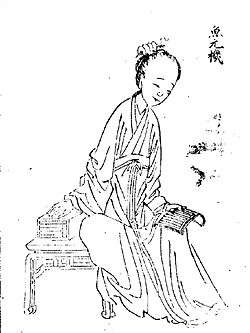Yu Xuanji

Yu Xuanji (simplified Chinese: 鱼玄机; traditional Chinese: 魚玄機; pinyin: Yú Xuánjī; Wade–Giles: Yü Hsüan-chi, approximate dates 844–868/869), courtesy names Youwei (Chinese: 幼微; pinyin: Yòuwēi) and Huilan (simplified Chinese: 蕙兰; traditional Chinese: 蕙蘭; pinyin: Huìlán), was a Chinese poet and courtesan of the late Tang dynasty, from Chang'an. She was one of the most famous women poets of Tang, along with Xue Tao, her fellow courtesan.[1]
Her family name, Yu, is relatively rare. Her given name, Xuanji, means something like "Profound Theory" or "Mysterious Principle," and is a technical term in Daoism and Buddhism. "Yòuwēi" means something like "Young and Tiny;" and, Huìlán refers to a species of fragrant orchid. She is distinctive for the quality of her poems, including many written in what seems to be a remarkably frank and direct autobiographical style; that is, using her own voice rather than speaking through a persona.
Biography
Little trustworthy information is known about the relatively short life of Yu Xuanji.[2] She was born or grew up in Tang capital Chang'an,[3] which was the terminus of the Silk Road and one of the most sophisticated cities of its time. Yu was married as a concubine, or lesser wife, to an official named Li Yi (simplified Chinese: 李亿; traditional Chinese: 李億; pinyin: Lǐ Yì) at 16, and after separating three years later she became a courtesan and a Daoist nun. She was a fellow of Wen Tingyun, to whom she addressed a number of poems. She died early, at the age of 26 to 28. Apart from names and dates in her poems, the tabloid-style Little Tablet from the Three Rivers, (三水小牘), gives the only purported facts about her life, although these are salacious in detail: that she had an affair with Wen Tingyun, lived a scandalously promiscuous life, and was executed for allegedly beating her maid to death. This account is considered semi-legendary, and may be a reflection of the traditional distrust of women who were strong-willed and sexually independent.[1]
Poetry
Yu Xuanji was a late Tang dynasty poet. In her lifetime, her poems were published as a collection called Fragments of a Northern Dreamland, which has been lost. The forty-nine surviving poems were collected in the Song Dynasty mainly for their freak value in an anthology that also included poems from ghosts and foreigners.
English translations
Published in 1998, her work was translated by the team of David Young and Jiann I. Lin.[4] In the 2000s, her work was translated by Stephen Owen and Justin Hill.
Notes
- 1 2 Chang, Kang-i Sun; Saussy, Haun; Kwong, Charles Yim-tze (1999). Women Writers of Traditional China: An Anthology of Poetry and Criticism. Stanford University Press. pp. 66–67. ISBN 978-0-8047-3231-4.
- ↑ Young and Lin, ix.
- ↑ Young and Lin, ix, citing the Guoyu Cidian.
- ↑ Young and Lin, publication information from title page and copyright notice
References
- (in Chinese) Fu, Shousun, "Yu Xuanji". Encyclopedia of China (Chinese Literature Edition), 1st ed. Archived from the original on 29 September 2007.
- Young, David and Jiann I. Lin. The Clouds Float North: The Complete Poems of Yu Xuanji (Wesleyan University Press: Hanover and London, 1998) ISBN 978-0-8195-6343-9
External links
- The Clouds Float North: The Complete Poems of Yu Xuan Ji, translated by David Young
- Hill, Justin (2005). Passing Under Heaven - A novel inspired by Yu Xuanji's life.